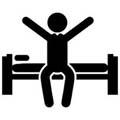Life
5 Great Ways to Kickstart Your Morning

A good day starts with a great morning ritual. One that consists of healthy habits, some quiet time for yourself and successful routines.
How you spend your morning is how you spend the rest of the day, and basically how you spend your whole life, as it is a series of days.
And if you manage to start each one with a few of the following, you’re sure to have the life of the people you look up to – the great successful role models of our time that know how to be productive and are mindful of everything they do.
So here are the best things you can include in your morning ritual:
1. Get up early
 It all starts here. It won’t really matter what you’re going to do first thing after getting up, if it’s already noon and everyone else has got so much stuff done.
It all starts here. It won’t really matter what you’re going to do first thing after getting up, if it’s already noon and everyone else has got so much stuff done.
That’s a keystone habit, a powerful one. It takes time, but it’s worth it. Once you implement this every day, it will affect other habits – you’ll have more energy, be more productive, go to bed earlier, find time for yourself, etc.
Also, there’s something magical about the early hours of the morning. So use them in the best way possible.
2. Meditate
 All you need to do is try to empty your mind for a few minutes.
All you need to do is try to empty your mind for a few minutes.
Don’t think too much about the position of your body, whether you’ve eaten before that or not, don’t try too hard or try to control your thoughts.
Just relax, breathe deeply, let go of all your worries and leave what happened yesterday or what might happen today behind. Your goal is to stand still, enjoy the silence and focus on your breathing.
Do that each morning and soon you’ll be able to keep that state for longer.
Meditation has a phenomenal effect on your mind and soul.
3. Write
 Writing is a therapy. It’s a beautiful experience where the mind wonders and you get to follow its journey by writing down the thoughts it gives birth to.
Writing is a therapy. It’s a beautiful experience where the mind wonders and you get to follow its journey by writing down the thoughts it gives birth to.
Here, you also need to just go with the flow. Write whatever comes first in your head and don’t think about how it looks, whether you’ll share it on your blog later, or if it needs editing.
Write your problems out. Share your secrets, dreams, desires and fears with a piece of paper. This way you’ll get them out of your head and will clear your mind for the day.
Plus, you get to do that in the best time of the day – the early morning – when your mind is still not fully awake, and dares to think of unusual ideas and interesting scenarios.

4. Drink a glass of water with lemon
 Most of the times our body just needs water, nothing else. And after sleeping for so many hours, it’s dehydrated.
Most of the times our body just needs water, nothing else. And after sleeping for so many hours, it’s dehydrated.
Give your immune system a boost and get some vitamins by adding lemon juice to it.
Lemon also alkalines your body very well which serves as a great way to keep the inflammation down.
You can also drink it warm.
This way you’ll wake up the body pleasantly. It will feel great that you don’t burden it with the usual dose of caffeine and will celebrate that by being fresh all day.
5. Figure out your MIT’s.
 Another thing highly productive people do is to decide which their most important tasks are in the morning, and then start working on them right away.
Another thing highly productive people do is to decide which their most important tasks are in the morning, and then start working on them right away.
Choose 3 of them and stick to them until they are completed.
If you work without any distractions and really commit to that, you’ll be proud to say that by noon you’ll have finished more things (essential ones) than most people do for a whole day.
It will also become the driving force that will get you motivated to keep yourself busy with other important stuff, and thus you can soon master productivity.
It’s not a coincidence that all successful people out there, who dare to follow their dreams and put effort into reaching their goals every single day, have habits like these.
It’s what really works. But nothing can convince you more than trying it out for yourself.
That’s the best way to kickstart your day, make the best of your morning and get ahead with what you want to achieve in life.
What other things can you add to this list?
Life
Imposter Syndrome Is Rooted in Your Past But Here’s How You Can Rewire It
Imposter syndrome is most prevalent in highly successful women

Imposter syndrome is “the persistent inability to believe that one’s success is deserved or has been legitimately achieved as a result of one’s own efforts or skills.” (more…)
Life
The Surprising Mental Health Tool You Probably Haven’t Tried
Through journaling, I arrived at a more balanced perspective, it reinstated my sense of gratitude and led me to accept my disability

In two particularly difficult times in my adult life, my journaling practice is helping me heal emotionally. It has been a vital tool for helping me see the bigger picture and land in a place of gratitude. (more…)
Life
How to Stop Comparing Yourself to Others and Find True Happiness
Comparison is the thief of joy; it robs us of our happiness, self-esteem, and peace of mind

In today’s hyperconnected world, it’s easier than ever to fall into the trap of comparing ourselves to others. Social media platforms like Instagram, Facebook, and LinkedIn constantly bombard us with curated highlights of other people’s lives, making it seem like everyone else is happier, more successful, and more fulfilled than we are. (more…)
Life
Harness the ‘Battery Effect’ to Transform Life’s Tensions into Your Greatest Strength
Recharge your life batteries by shifting your mindset today

I believe our life capacity is determined by the skillsets we develop on this spinning rock we call Earth. By “life capacity,” I mean our ability to embrace and sustain joy. (more…)
-

 Did You Know4 weeks ago
Did You Know4 weeks ago7 Surprising Life Lessons Video Games Taught Me That School Never Did
-

 Success Advice4 weeks ago
Success Advice4 weeks agoHow Playing by the Rules Became the Smartest Business Strategy
-

 Success Advice3 weeks ago
Success Advice3 weeks agoHow to Build Trust, Kill Micromanagement, and Lead a Team That Thrives
-

 Success Advice3 weeks ago
Success Advice3 weeks agoSuccess Isn’t Sexy: 5 Daily Habits That Actually Work
-

 Scale Your Business3 weeks ago
Scale Your Business3 weeks agoHow to Build a Workplace People Actually Want to Show Up To
-

 Scale Your Business3 weeks ago
Scale Your Business3 weeks agoHow Smart Entrepreneurs Cut Financial Chaos in Half with One Simple Switch
-

 Success Advice3 weeks ago
Success Advice3 weeks agoBreaking the Bias: How Females Can Thrive In The Workplace in 2025
-

 Scale Your Business2 weeks ago
Scale Your Business2 weeks agoThis Is How Successful Entrepreneurs Manage Their Time Differently






























11 Comments